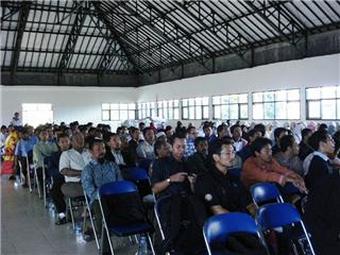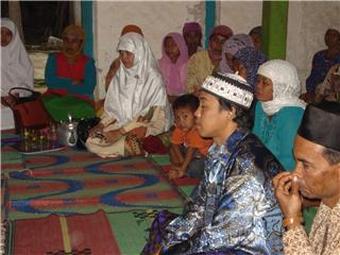PKS gets serious about recruitment in Malang
Ulla Fionna
PKS PengajianUlla Fionna |
Indonesian political parties are often cast as being self-centred, power-hungry, and corrupt. But there are still at least some reasons to be optimistic about Indonesia’s political future. While most political parties have very much continued in the mold of New Order politics, others are committed to establishing different patterns. The clearest example of this trend is PKS (The Prosperous Justice Party), a modern Islamic party that has provided Indonesia with an alternative model of grassroots party building centred around recruitment.
Ten years after reformasi, Partai Golkar and PDIP (The Indonesian Democratic Party of Struggle) continue to rely heavily on star candidates and established voting patterns to keep them in business. For them, recruitment is much less important than ensuring that people vote for them at election time. At the local level, this is reflected in the fact that neither party holds activities specifically designed to attract new members. Instead, they focus on purely social events, like public performances and community service activities, to garner voter support. In contrast, PKS is a recruitment-driven party committed to establish a growing, strong and active grassroots-based organisation. PKS branches are maintained by young, technology-savvy Muslim students, committed to establishing active and effective administrative structures. These structures underpin an intensive program of activities designed not only to raise awareness of the party, but to grow its membership base. Accusations that PKS has stolen other parties’ cadres and members only serve to demonstrate the failure of the ‘victims’ to maintain relationships with their members – allowing PKS to gain the advantage.
Every one of PKS’ many activities has a strong Islamic theme designed to attract young, educated Muslims
PKS’ recruitment methods are examples of simple and practical ways to connect with the community. In the East Javanese district of Malang, these activities have succeeded in attracting greater commitment and direct political participation from supporters, rather than simply attracting more votes. PKS’ success in this area doesn’t just tell us something about PKS. It demonstrates that – should they choose to use them – political parties now have access to new ways to establish direct relationships with the grassroots which can serve to encourage community participation in politics.
Islam as a recruitment tool
In keeping with its image as a modern Muslim dakwah (proselytization) party, every one of PKS’ many activities has a strong Islamic theme designed to attract young, educated Muslims. This image is an important asset for the party when competing with other, more traditional, Islamic parties that represent older generations of Muslims. In Malang, PKS’ branches have used the concept of dakwah both to spread Islam and enlarge the party’s support base. For example, in 2005, when I was doing fieldwork in Malang, in a period of just a few months the party organised a display of Islamic caricatures in the city square, a long march to call Muslims to prepare for Ramadan, and Islamic marriage preparation sessions.
 |
PKS Open MeetingUlla Fionna |
Malang’s PKS branches also hold regular ‘open houses’ at public places such as libraries and community halls. Venues are set up with booths decorated with photographs and brochures describing the activities of different party divisions. These activities include sessions of Islamic book discussions and question and answer sessions on Islamic topics led by Muslim scholars or party leaders. The use of microphones ensure that passers-by are aware of these events. These ‘open houses’ are not just designed to raise public awareness about the party. They aim to attract new members to PKS. Party representatives from different divisions attend the booths to chat with visitors and promote the party. There are even special booths for visitors who wish to register as members on the spot. Local leaders have attested to the effectiveness of these events, claiming that hundreds of new recruits join at each open house. PKS is the only party in Malang to hold events of this kind.
PKS’ emphasis on direct recruitment is also reflected in their program of regular leaflet distribution, often timed to coincide with other community service events, such as cleaning public facilities. Other parties have also used this method, but, in Malang at least, the frequency and intensity of PKS’ leaflet distributions is unmatched. Party cadres typically wear party gear (t-shirts, headbands, and carry party flags) while disseminating party leaflets to the general public. On one such occasion, which took place in a bus terminal, two female cadres greeted passengers getting off mikrolets while passing the leaflets. Contact details of cadres from different sub-districts are clearly visible on the leaflets for those interested in joining. PKS also uses regular Qur’anic study groups as training sessions for its members. These meetings provide a forum for information sharing about party policy as well as for queries on the practice of Islam in daily life. Attendance is important for recruitment, and is also a formal prerequisite for career advancement within the party. The Qur’anic study groups provide a significant competitive advantage for PKS because they are seen as more as religious events than as purely political activities. Since even PKS’ smallest sub-branches hold regular Qur’anic recital activities, they help the party develop support right down to the grassroots.
The frequency and relentlessness of PKS’ recruitment activities are also a strong indication of the level of branch organisation within the party. The local branches execute party programs efficiently, and local personnel are clearly committed to ensuring that every activity is conducted as planned. Again, this provides a stark contrast with the majority of political parties, not only under the New Order, but in the decade since. PKS thus serves as an important success story in a political context where local branches are often left to fend for themselves, with little or no support from central offices. These activities, in line with party platform-as-dakwah movement, reflect the party’s deep organisational structures and flexible approach.
A new model
PKS’ conscious adoption of an Islamic outlook may eventually restrict further development of the party’s membership and support base. To date, party leaders have been forced to be ambiguous over the party’s support for syariah – which can be argued as an important contributing factor to PKS’ continuing support. Some observers have also noted that the party struggles at times to keep its ‘clean’ and ‘special’ image once in the electoral arena. Most notably, PKS has resorted to the practical approach favoured by other parties when choosing candidates local elections – favouring individuals from outside the organisation who have either popular support or a strong financial base over their own pool of cadres
PKS’ conscious adoption of an Islamic outlook may eventually restrict further development of the party’s membership and support base
However, these very real concerns notwithstanding, while other parties continue to struggle to adjust to the rapidly changing political arena, PKS has demonstrated that it is up to the challenge. In particular, PKS’ aggressive recruitment approach – the most intensive since the recruitment drives of the Indonesian Communist Party in the 1950s – represents an important development in the current political climate. In fact, its consistency and intensity provide a new model for Indonesian party politics. PKS’ recruitment strategy would have been unthinkable under the New Order, when the government ensured that parties had very limited opportunities to connect with the grassroots. However, PKS’ aggressiveness is also unusual amongst the parties of the reformasi era. As noted earlier, membership recruitment is not a priority for incumbent parties, such as Partai Golkar and PDIP, which chose to rely on social activities at the community level to secure votes. But PKS’ methods are bold even when compared to other new parties like the National Mandate Party (PAN), which focuses on door-to-door visits by cadres.
But while it may seem easy for other parties to follow suit, in reality PKS’ organisational superiority is in fact difficult to rival. Its young and committed cadres are driven, and they have made sure that the branches stay active and continue to attract public support. The long-term effectiveness of PKS’ recruitment schemes can only be determined over several election rounds. In the meantime, however, anecdotal evidence that the party achieved a significant increase in votes at the national level and locally in Malang in 2004 elections suggests that the party’s popularity increased over the last two election periods. In other words, PKS’ recruitment program is already showing signs of bearing fruit. ii
Ulla Fionna (ulla.fionna@usyd.edu.au) is a tutor and researcher at the University of Sydney and Macquarie University. She has recently submitted her PhD thesis, which examines parties’ branch-level activities in Malang.












